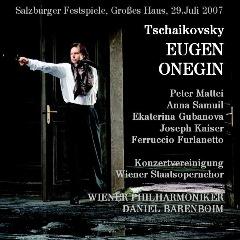Tchaikovsky – Eugen Onegin (Salzburg 2007)
Tchaikovsky – Eugen Onegin (Salzburg 2007)

1. Part 1 2. Part 2 & 3 3. Part 4 4. Part 5 5. Part 6 & 7 Renée Morloc - Larina, Gutsbesitzerin Anna Samuil - Tatjana, ihre ältere Tochter Ekaterina Gubanova - Olga, ihre jüngere Tochter Emma Sarkissián - Filipjewna, Amme Peter Mattei - Eugen Onegin Joseph Kaiser - Lenski, ein Dichter, sein Freund Ferruccio Furlanetto - Fürst Gremin Sergej Kownir - Ein Hauptmann Georg Nigl - Saretzki, Sekundant Ryland Davies - Triquet Thomas Köber - Vorsänger Blanka Modra - Schauspielerin Michel Ogier - Schauspieler Virginie Roy - Schauspielerin Konzertvereinigung Wiener Staatsopernchor Wiener Philharmoniker Daniel Barenboim – conductor Salzburger Festspiele, Grosses Haus, 28 July 2007
In Andrea Breth’s staging at Salzburg we meet the titular hero as early as during the orchestral introduction, slumped in a chair watching TV, showing an eternal railway filmed from an onrushing train, a scene that recurs at the beginning of the following acts. The ageing Onegin contemplating his unsuccessful journey through life? That he has himself to blame for his failure we know all too well already and Peter Mattei makes it even clearer through his uncommonly forbidding portrayal of the haughty snob. Whatever attracted Tatyana to him? Not until the last act does he realize his mistakes and as the magnificent actor he is Peter Mattei then reveals deeper feelings formerly hidden behind the arrogant façade. Since Anna Samuil’s matured Tatyana by then is Onegin’s equal, socially and mentally, their heated confrontation becomes a real high-spot that remains on one’s retina for a long time.
The action has been moved to fairly recent times and we encounter a rather decadent Russia, short on joy, short on warmth, rich on cynicism and heavy drinking. The festive polonaise is danced by a sole sloshed man whose sense of rhythm has long since deserted him. If this is the 1980s, as the booklet notes suggest, we are probably witnessing the disintegration of the Soviet society. But there are always risks when a director transports the action to another time and in this opera the central duel scene is totally out of place in (almost) present time – an anachronism if ever there was one. The outcome of that scene is still tragic and one can’t help feeling pity for poor Lensky who dies on a stage filled with water. The strangest thing of all is when Filipyevna, who has had a strongly dominant function throughout the first act, goes to sleep in a newly dug grave. One associates this in a vague way with Erda in Siegfried – but why?
It’s short on romance as well and Tatiana’s letter scene, well sung and well acted though it is, falls flat when she types the letter to Onegin. All in all there were several things that robbed this gloomy but beautiful score of some of its magic. It was however saved by wonderful lush playing from the Wiener Philharmoniker under an evidently inspired Daniel Barenboim. We also get good singing and acting from both principals and cameos. Of the latter Ryland Davies, in the 1970s and 1980s one of the finest lyric tenors around, now in his mid-sixties was a wonderful tragicomic Triquet with the voice still in fine fettle. Ferruccio Furlanetto was a classy Prince Gremin and Ekaterina Gubanova was no mean Olga. Impressive for his sensitive acting as well as fine lyric singing was Joseph Kaiser’s Lensky. A long scar on his cheek seemed to tell us that he probably had been involved in fights over similar matters before.
Anna Samuil was young and innocent looking and her letter scene, in spite of the typewriter, was deeply affecting and Peter Mattei is possibly the leading Onegin in the world today. He dominates the stage not only through his physical appearance but even more through his expressivity and, of course, the magic beauty of his voice. I saw him on TV a couple of years ago in a French production of this opera where he was just as good.
The experienced Brian Large supervised the video production expertly but there were a couple of places that the stage became messy, whether due to the direction or the camera work I can’t tell. The sound was splendid.
Not a production that I could buy wholeheartedly but the singing and acting was certainly on a very high level. ---Göran Forsling, www.musicweb-international.com
download (mp3 @320 kbs):
yandex 4shared mega mediafire uloz.to cloudmailru








